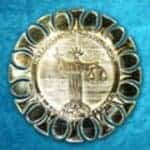News
The Adelaide Medal

The Adelaide Medal was introduced at the 12th Meeting of the International Association of Forensic Sciences in 1990 to mark the holding of the IAFS meeting in Adelaide. It was provided by the then IAFS President, Dr Bill Tilstone and the South Australian Branch of the Australian and New Zealand Forensic Science Society.
The view of the organizing committee at the time was that the medal should be for scientific achievement that had a marked influence on the forensic sciences from an international perspective. Work that resulted in a change of direction, new thinking or significant improvement in current methodologies should be recognised. It was not intended that the award be for management or administrative achievement.
Please contact the SA Branch or anzfss_executive@outlook.com for more information.
Previous recipients of the Medal are:
| Year | Recipient | Country |
| 2023 | Prof James Robertson | Australia |
| 2020 | Dr John Buckleton | New Zealend |
| 2017 | Prof Cristina Cattaneo | Italy |
| 2014 | Dr Tony Raymond | Australia |
| 2011 | Dr Angel Carracedo | Spain |
| 2008 | Dr William (Bill) Bass | USA |
| 2005 | Sir Alec Jeffreys | United Kingdom |
| 2002 | Mr Alastair Ross | Australia |
| 1999 | Dr Ian Evett | United Kingdom |
| 1996 | Mr Bryan Culliford | United Kingdom |
| 1993 | Dr Ray Williams | United Kingdom |
| 1990 | Mr Doug Lucas | Canada |
Requirements and Operation
- The Medal shall be known as the ADELAIDE MEDAL
- One Medal shall be awarded at each IAFS meeting
- The Medal shall be awarded for personal, significant contribution to the advancement of the forensic sciences
- The recipient must be, or have been, a practitioner
- The recipient must be outstanding in his or her area
- The Medal should be inscribed with the name of the recipient and the year of presentation
- A citation from the Council of IAFS should accompany the presentation of the Medal
Nomination Procedure and Selection Process
Nomination of candidates for the Adelaide Medal will be initiated by the IAFS President in-office, at the request of the Committee of the Australian and New Zealand Forensic Science Society (South Australian Branch) 12 months prior to the date of the IAFS meeting at which the Medal will be awarded.
The following organisations are each invited to recommend a candidate for the Medal together with a summary of their candidates’ achievements (see submission guidelines below):
- Organising Committee of the IAFS Meeting
- American Academy of Forensic Sciences
- Australian and New Zealand Forensic Science Society
- European Network of Forensic Science Institutes
- Forensic Science Society of the United Kingdom
- Mediterranean Academy of Forensic Sciences
The nominations will be passed to the Council of IAFS for forwarding to the Australian and New Zealand Forensic Science Society no later than 6 months prior to the IAFS meeting. After reviewing the submissions, the Australian and New Zealand Forensic Science Society will prepare a list of four names, with one being the suggested recipient of the medal for consideration by the South Australian Branch. This consideration will take place at least 5 months prior to the IAFS meeting. Once the winner of the Medal has been finalised, the medal will be engraved, and forwarded to the Organising Committee for presentation at the IAFS Meeting. The recipient will be notified no later than 4 months prior to the IAFS meeting. To raise the awareness and prestige of the Adelaide Medal, the winner will be invited to give a plenary lecture on the occasion when he or she receives the medal.
Submission Guidelines
The following information should form the summary of each candidate’s achievements and may be provided in prose or dot points:
- Brief biography including background, qualifications and current position (up to 500 words)
- Specific contribution to the advancement of the forensic sciences, outlining work as a practitioner and the outstanding nature of the contribution (up to 750 words)
- Awards and prizes
- Publications
- Total number of peer-reviewed publications (e.g. journal articles, book chapters, books)
- A selection of up to 10 with a 50-word explanation of the importance of the selected published work
- Major research projects/grants/patents
- Total number of these
- A selection of up to 10 with a 50-word explanation of the importance of each
